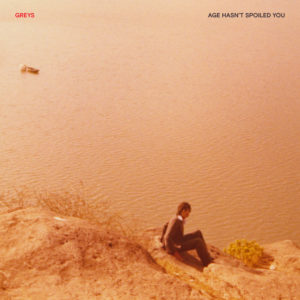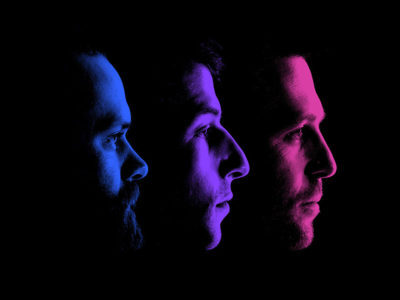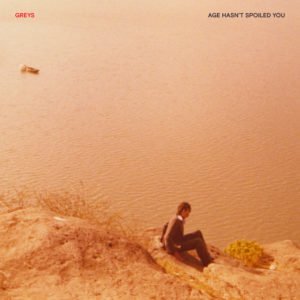The Accidental Fun of Golden Drag

Several albums into Greys, Shehzaad Jiwani wanted to have a side-project that could go just about anywhere. After working with some friends on music as Golden Drag, he had to find a whole new cast of collaborators to record it, and had to steer the ship himself as a result. We caught up with Jiwani to talk about the making of his solo-ish record and why Golden Drag was more about having fun than necessarily finding something new.
Northern Transmissions: How did your long-distance project start with Golden Drag and what did it offer you that Greys didn’t at the time?
Shehzaad Jiwani: It wasn’t to say that Greys wasn’t offering me something. I had actually just been talking to a friend about a for-fun side-project, if anything as more of a song writing exercise. I had sent these short songs that we could then deconstruct any way we wanted from there. It was a mix of sonic references to Stereolab and early Eno stuff, but also with Wire-like writing where it’s really short and economical.
Then everyone got busy! But I’d already written all these songs and booked time at a studio with my friend Josh. So I figured I’d just record the songs and see how they’d go. It was really cool to do something that was the opposite of what Greys does. It feels like an accidental record more than anything, and I didn’t see it as a solo project because it was never conceived as such. I wrote all these melodies for male and female voices, so picking people turned it into this amorphous sounding thing too. It was really just a fun and liberating process writing short pop tunes.
NT: How exactly did Golden Drag go from a collaborative project to something more solo, and how do you feel that changed things?
SJ: It’s hard to know how it changed things, because I was so hands on, and knew how I wanted to execute things. I still wanted to experiment in the studio with Josh, and he pushed me in a few directions that I might not have gone otherwise. I’m not sure if I would’ve had a different direction with someone else or if I just really put my stamp on this one. There are some consistencies between this and the last Greys record, but I do see it as its own thing as well. The songs would change and the overall feeling of the album changed so much by the end that I wish I’d known what it would sound like from the start.
NT: On this note how did Nate Dionne, Laura Hermiston and Julie Fader come into the fold and what was it like working with them?
SJ: Nate plays bass on everything across the record, and he was one of the people I’d wanted to work with for years, since I’ve known him really. He also sings which is cool because I think our voices sound really nice together. It’s cool to have a project where I can just play with all my friends, because it just sounds like I’m hanging out with my friends. Laura came in at the drop of a hat, we were just doing additional vocals one day and she was down to join. She nailed all her vocals in virtually one take each. People would call in vocals by phone if they were on tour. Graham Walsh mixed the record, and Julie is his wife, and we spent so much of that time talking while the mix was going. We talked about how much we wanted these Stereolab-y vocals on “Aphex Jim” and she just walked in and did it. Those turned into some of my favourite moments on the record because of how we just knocked them out.
NT: I was also interested to hear how “Aphex Jim” came out of trying to escape your comfort zone and how you feel it came out?
SJ: My brother has this sampler-clone machine with a bunch of instruments. Playing around with it helped me open up the way I was writing, because as much as we’ve used synths and stuff like that in Greys we’ve never used them as the stock of the soup for a song. I had this drum-machine, and just put a melody and chords on top of it for “Aphex Jim.” That dictated most of the rest of the record too. A lot of what I did at home is what ended up on the record honestly. Josh is a modular wizard so he added more of those.
NT: Alternatively, you’ve spoken about approaching “Caught Leaking Light” as this total mess around almost jingle tune?
SJ: It was actually pretty similar. I was on my couch watching a movie, and then started humming along this melody and then a groove. I’d start recording them onto my phone until I was nodding and thinking “This Works.” It was really simple, and I made it that way so we could do anything with it in the studio. I didn’t want to over-think it because some of Greys’ material can be cerebral in a way, and I would always go with music first and then find a way to sing over it. Everything on this record was about melody and then adding chords after. That’s been such a rarity in Greys because up until recently we really haven’t been that melodic of a band. It’s weird to consider as an experience because that’s (Laughs) how most people write songs.
NT: How do you see collaboration factoring into Golden Drag’s future, or does it seem more intriguing to follow it as a solo endeavour now?
SJ: I’m already writing and have songs ready for another record. Since I was so interested with that sound that we had at the end of the record, it inspired to write so much more and gave me so many ideas on where to take it. It’s a blank canvas which is really liberating because you can take it any direction and there are no wrong answers. With Greys it’s not that we feel trapped, but it’s a bigger ship to steer compared to the speed boat I have here. I feel like I was aiming for an
NT: How do you want to explore Golden Drag live in the future?
SJ: As far as live, my friends have even asked if I need help with one. We had been working on Greys material though since I hit the studio with this so it hasn’t been on my mind. I need it to exist in its own space though, so I need to write a few more songs to do that.
Words by Owen Maxwell
Latest Reviews
Tracks
Advertisement
Looking for something new to listen to?
Sign up to our all-new newsletter for top-notch reviews, news, videos and playlists.









